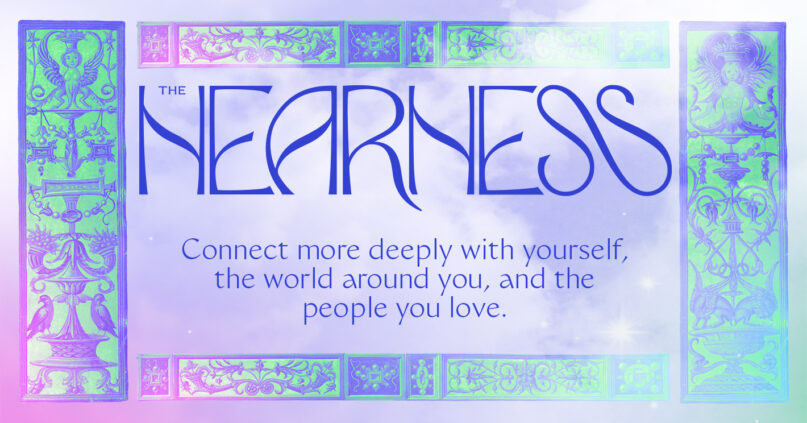(RNS) — Tunja L. Morton, 54, couldn’t put a finger on what it was she was looking for when she tore up the picture of Christianity she had been raised in in the South.
While she still identifies as Christian, the Mississippi-based self-care coach knew she wanted “religion” and “church” to look different for her two daughters, now 18 and 22. She wanted to model what that might look like for them.
Two decades later, Morton said, she’s finally found language to express what it is she’s been seeking in The Nearness, an online community that aims to foster connections among the growing population of spiritual but not religious.
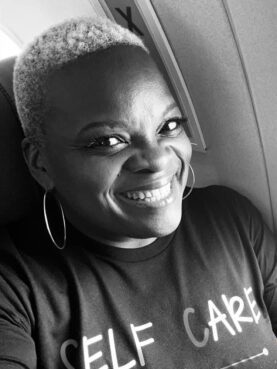
Tunja L. Morton. Courtesy photo
“In hindsight, what The Nearness has taught me up until this point is, first of all, everybody needs a space that is welcoming, affirming, honest, real and filled with compassion, and that was the opposite of my church experience,” she said.
RELATED: How America’s youth lost its religion in 1990s (COMMENTARY)
The Nearness, launched last fall by Casper ter Kuile and Alec Gewirtz, aims to bring together people of all religious and nonreligious backgrounds as they nurture and define what spirituality looks like for themselves outside of traditional religious institutions.
It offers eight-week courses that bring together small groups of five to six people for weekly online discussions around themes like “Letting Go,” creating community for those finding meaning outside of a church, synagogue or other house of worship. That can be a lonely pursuit, its website notes — a podcast here, a spiritual self-help book there.
There is guidance from spiritual teachers of various traditions as well as prompts for reflecting, asking questions, finding connection and experimenting with new practices and rituals.
“One of the things that really strikes me is that we’re all drowning in content, but what we need are containers for connection,” said ter Kuile, a Harvard Divinity School researcher who has written about ritual and explored spiritual practices as co-host of the podcast “Harry Potter and the Sacred Text.”
The idea for The Nearness grew out of conversations ter Kuile had with Gewirtz, who first reached out to ter Kuile when Gewirtz was studying and building nonreligious community at Princeton University. They thought at first about creating a magazine before realizing people were hungry for connection more than the content.
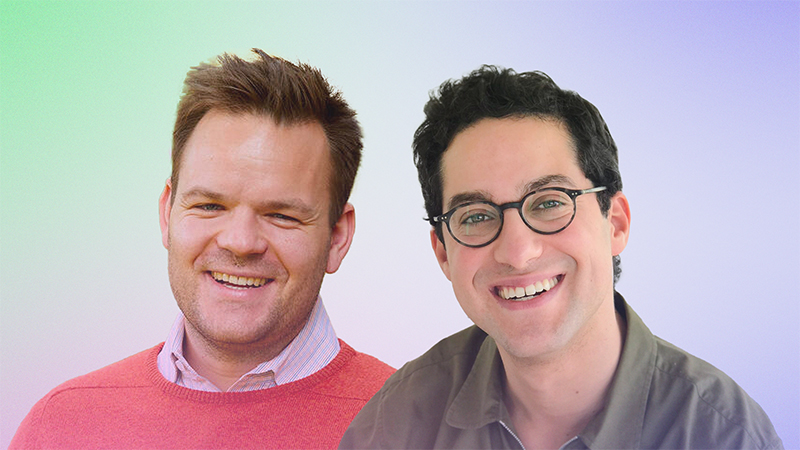
Casper ter Kuile, left, and Alec Gewirtz co-founded The Nearness. Image courtesy of The Nearness
They started piloting what would become The Nearness last spring.
Its third round of courses, also called “journeys,” began this week. About 250 people have signed up, ter Kuile said, coming to the community from more than 37 states, 15 countries and a mix of religious backgrounds.
“What’s fascinating is that we thought we would be designing for people who are kind of spiritual but not religious, and it was surprising to us the number of people who have shown up who are still affiliated, but not connected to a congregation,” he said.
RELATED: 2021 might be unpredictable, but don’t ditch your datebook. Planning can be a spiritual exercise
Ter Kuile points to the data: Participation in institutional religion is declining, the number of friendships people have is declining, feelings of disconnection and isolation are increasing. At the same time, ways to connect online exploded as people sheltered at home during the COVID-19 pandemic.
“It felt like kind of the needs of the world and then these new tools illustrated a path forward,” he said.
While many people may have left traditional worship spaces, their desire for connection — with themselves, with each other, with a sense of something bigger — continues, he said.
That’s “all the good stuff,” he said. It’s the way people make meaning out of the joy and suffering they experience.
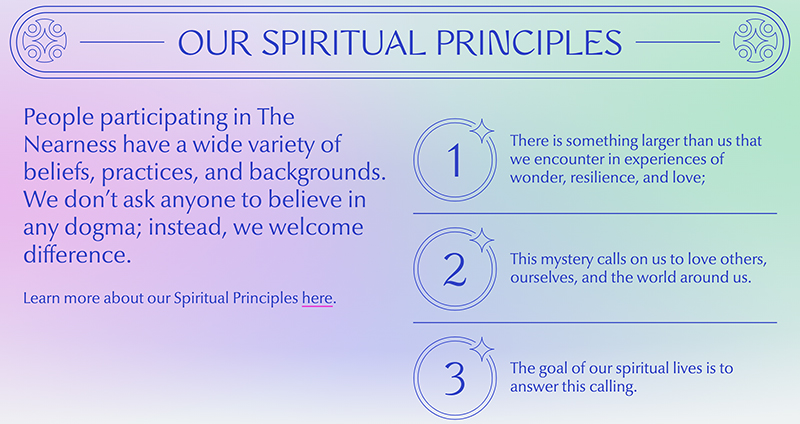
The Nearness spiritual principles. Image courtesy of The Nearness
Rituals help, too, by marking transitions or helping people notice what’s important to them. Ritual is integrated into The Nearness courses, with each small group meeting following a kind of liturgy of its own that involves lighting a candle and reading a community covenant before diving into discussion.
“Though we travel different paths, may we find comfort and hope in the gift of each other’s company,” the covenant reads in part.
Cari Meffle loves the ritual of lighting a candle together at the beginning of each meeting. It “feels really sacred,” she said.
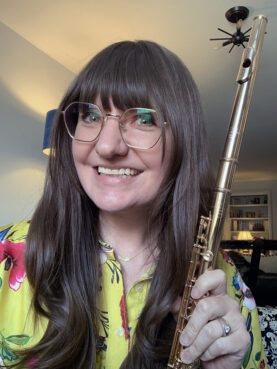
Cari Meffle. Courtesy photo
The 36-year-old flutist, who lives in Virginia, has been part of The Nearness since its pilot.
Meffle grew up Baptist and now works part time as a youth minister in a small Disciples of Christ church. You could call her an exvangelical, she said, but she’s most comfortable referring to her “heritage of Christianity.”
All of that fits into The Nearness, she said, whereas she never was comfortable with the certainty of the tradition she grew up in or worries she might overintellectualize small groups at her church now.
“It’s what was missing for me, so I hope other people can find what they were missing there as well,” Meffle said. “But I also love that what I’m missing isn’t the same as what someone else might be missing.”
RELATED: ‘Harry Potter and the Sacred Text’ creates spiritual experience for fans of secular series
